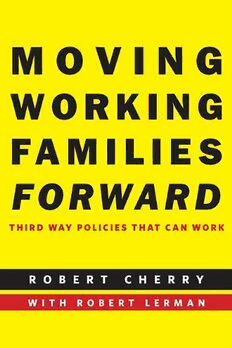
Moving Working Families Forward: Third Way Policies That Can Work PDF
264 Pages·2011·1.668 MB·English
Most books are stored in the elastic cloud where traffic is expensive. For this reason, we have a limit on daily download.
Preview Moving Working Families Forward: Third Way Policies That Can Work
Description:
Even as our political system remains deeply divided between right and left”, there is a clear yearning for a more moderate third way that navigates an intermediate position to address the most pressing issues facing the United States today. Moving Working Families Forward points to a Third Way between liberals and conservatives, combining a commitment to government expenditures that enhance the incomes of working families while recognizing that concerns for program effectiveness, individual responsibility, and underutilization of market incentives are justified. While conservatives often propose economic incentives to promote desirable behavior, and liberals are often aghast at these policies, Third Way advocates take a more flexible position.Robert Cherry and Robert Lerman provide the context to understand the distinctive qualities of Third Way policies, focusing on seven areas that substantially affect working families: immigration, race and gender earnings disparities, education, housing, strengthening partnerships, and federal taxes. Balancing quantitative empirical studies with voices of working class people who are affected by the policies being discussed, they argue that, in each of these areas, Third Way policies are superior compared to those proposed by the right and the left, offering an engaging and important perspective on how public policies should be changed. A timely approach, Moving Working Families Forward makes policy recommendations that are both practical and transformative.
See more
The list of books you might like
Most books are stored in the elastic cloud where traffic is expensive. For this reason, we have a limit on daily download.
